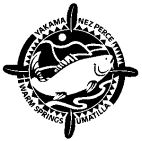
Portland, Oregon, 97232
Fax (503) 235-4228
www.critfc.org
 |
COLUMBIA RIVER INTER-TRIBAL FISH COMMISSION | |
|
729 N.E. Oregon, Suite 200, Portland, Oregon, 97232 |
Telephone (503) 238-0667 Fax (503) 235-4228 www.critfc.org |
|
| TO: | Brigadier General Strock | COE-NPD |
| Steven Wright | Acting BPA-Administrator | |
| William Branch | COE-NWD-NP - Water Management | |
| C. Henriksen, R. Turner | COE-NWD-NP-WM-RCC | |
| Doug Arndt | COE-NWD-Portland | |
| Lt. Col. W. E. Bulen, Jr. | COE-NWD-Walla Walla | |
| J. William McDonald | USBR-Pacific Northwest Regional Director | |
| G. Delwiche, T. Lamb, R. MacKay | BPA-PG-5 and BPA-PGPO | |
| FROM: | Don Sampson, Executive Director | |
| DATE: | August 14th, 2001 | |
| SUBJECT: | McNary Operations | |
The Columbia River Inter-Tribal Fish Commission, on behalf of its member tribes the Nez Perce Tribe, the Yakama Nation, the Confederated Tribes of the Umatilla Reservation, and the Confederated Tribes of the Warm Springs Reservation, requests the following operations for the Lower Columbia FCRPS projects.
SPECIFICATIONS:
McNary - Spill 30 kcfs, 12 nighttime hours, every other day during non-transport days.
On days when not transporting return migrants directly to the river and do not route through the facility unless for sampling.
JUSTIFICATION:
CRITFC advocates a risk strategy that would be better for the migrants to insure the maximum possibility for survival. Allowing fish to continue to migrate is preferable to holding the juveniles in raceways that are exceeding 70 deg F. Mortality levels are increasing and CRITFC wants operations in effect before any large-scale mortality incident occurs.
Lower river spill is essential, especially in a drought year, for the millions of listed and unlisted sub-yearling salmon migrating from and through the Lower Snake, the Mid-Columbia, and the Lower Columbia. Washington Department of Fish and Wildlife's current estimate of subyearling passage at McNary indicates that 370,000+ salmon have passed through the dam during the last week (WDFW McNary Report # 19). Spill should be implemented to the stated levels listed above to help protect the remainder of the summer migration through August 2001.
Spill should be implemented at stated levels to "spread the risk" of hydrosystem passage. Using smolt-to-adult survival rates, negative transport to in-river ratios have been documented by PATH for summer migrants that are transported instead of left in the river via spill. Fish guidance efficiency rates in bypass systems are much lower for summer migrants than spring migrants and are averaging only 50% this year. Temperatures in bypass and transportation facilities have been higher (with a maximum temperature of 74 degrees F at the separator and 73.2 deg F in the raceways last Friday) than the ambient temperature in the tailwater, which can cause elevated direct and delayed mortality from disease, de-scaling, and physical injury. Temperatures are expected to stay hot through Friday, August 17th. Juvenile salmon mortality rates at the McNary Dam bypass system have increased to nearly to 2.6 % and seem to be moving upwards (WDFW McNary Report # 19). USBS studies indicate that lack of spill can cause migrants to move upstream instead of downstream. Additional justifications for summer spill are given in the Fish Passage Advisory Committee's Joint Technical Staff Memorandum dated June 21, 2001, which critiques the NPPC's summer spill survival analysis.
At projects with nighttime spill, at dusk, turbine units should be sequentially shut down starting at the shore units and ending at the units next to the spillway. Migrants can be led to the spillway using this operation. NMFS studies at John Day have shown that a 15% reduction in mortality can be gained by this operation over not sequentially shutting down units, thus, more fish can be bypassed with less spill (Columbia River Fisheries Council 1979). Spill should be implemented at all Lower Snake dams if bypass facility temperatures exceed the Clean Water Act temperature standard of 68 degrees F.
At the federal executive meeting on June 29, 2001, BPA told the region that they would reconsider implementing summer spill if conditions change. Power markets are down, the runoff forecast has increased slightly and BPA has available financial tools to implement immediate summer spill as specified by this SOR. If this SOR cannot be implemented, we request a detailed written response from the federal operators as to why the SOR cannot be implemented.